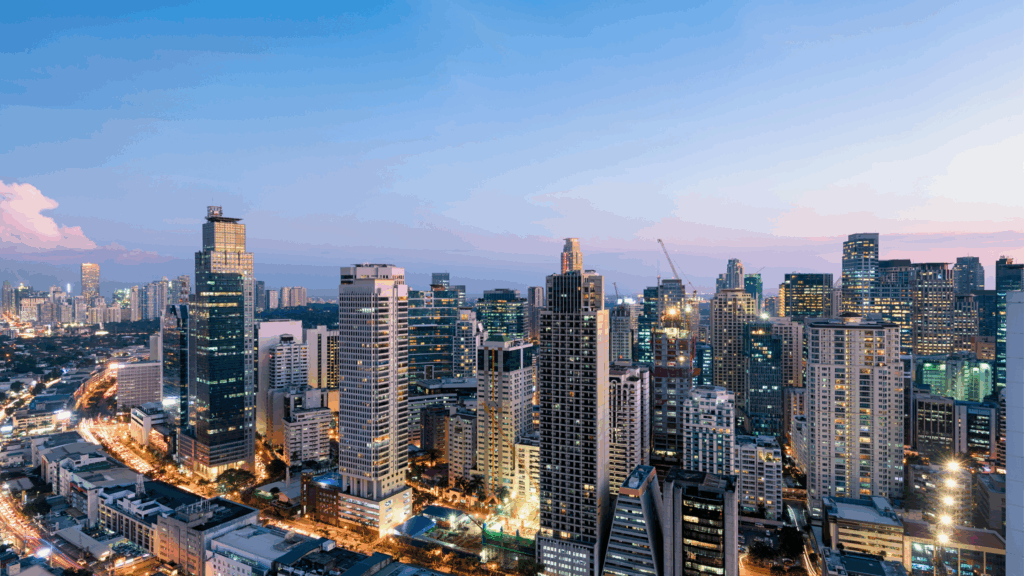Step-by-step guide to verifying businesses in the Philippines with local registry data

With its robust economic fundamentals, strategic Southeast Asian location and large workforce, the Philippines offers an attractive destination for companies aiming to explore new opportunities in a thriving market. These factors create a favourable environment for both regional and global businesses to establish and grow their operations. However, to ensure safe and compliant business dealings, it’s essential to understand how to verify a company in the Philippines. Proper verification helps businesses navigate the local landscape effectively and build trustworthy partnerships.
The Philippine GDP expanded by 5.6% in 2023, the fastest growing in Southeast Asia1. The government continues to implement pro-business reforms aimed at enhancing the ease of doing business, and invest heavily in infrastructure, bolstering connectivity across the country.
Additionally, the growing middle class offers a lucrative consumer base for businesses in retail, services and technology sectors. The country’s dynamic digital landscape, supported by widespread mobile penetration, further enhances the potential for e-commerce and fintech innovations, making it a prime location for investment in the Asia-Pacific region.
Building safe, sustainable business partnerships
In the Philippines, relationships hold significant importance in business culture. To keep these relationships both safe and sustainable, it’s important to understand how to verify a company in the Philippines.
This includes conducting thorough Know Your Business (KYB) and Ultimate Beneficial Owner (UBO) checks on potential new business partners, merchants and clients. Doing so helps prevent fraud and ensures that business dealings comply with all relevant regulations in the Philippines, keeping partnerships healthy and sustainable.
General guidelines
As a rule of thumb, any entity or professional engaged in financial transactions that could potentially be exploited for crimes such as fraud, money laundering or terrorism financing must comply with the regulations set forth in the Anti-Money Laundering Act of 2001 (AMLA).
This includes checking company registration in the Philippines.
According to AMLC Guidelines2 organisations should:
- Establish and record the identity of clients, both individuals and entities, using official documents.
- Identify and verify the identity of both legal and beneficial owners of the entity or individual being onboarded. This includes those with at least 20% ownership or control and those with significant management roles. Important note: The threshold for establishing beneficial ownership through ownership and/or voting rights varies by sector3 and the relevant regulatory body. It is advisable to conduct further research or consult with a local KYB and UBO expert in this area.
- Collect reliable and independent documentation or electronic data to verify the identity and ownership structure, ensuring accuracy in all cases.
- Maintain a comprehensive Money Laundering and Terrorism Financing Prevention Programme, which is regularly updated to reflect the latest regulatory requirements.
- Report beneficial ownership information to AMLC or other authorised government agencies immediately when requested as part of any investigation or inquiry.
For a complete list of entities required to comply with these rules, please refer to the guidelines provided by the Anti-Money Laundering Council (AMLC)4.
The AMLC collaborates with other regulatory bodies, including the central bank, Bangko Sentral ng Pilipinas (BSP), and the Securities and Exchange Commission (SEC) of the Philippines, responsible for the Philippines business registry.
Book a 15-min demo and see how AsiaVerify accelerates onboarding, reduces false positives, and keeps you audit-ready.
Recent regulatory updates to consider
The Philippines is ramping up its AML/CFT efforts
As a ‘jurisdiction under increased monitoring’, the Philippines is actively working with the Financial Action Task Force (FATF) and the Asia/Pacific Group on Money Laundering (APG) to strengthen the effectiveness of its AML/CFT regime. Businesses operating in the Philippines must be aware of the country’s enhanced efforts in this area.
Key aspects of the Philippines’ action plan5 include:
- Implementing active risk-based supervision to assess and manage the risks posed by designated non-financial businesses and professions.
- Ensuring that AML/CFT controls are in place and actively used to mitigate risks associated with casino junkets.
- Enhancing the accessibility and accuracy of beneficial ownership information for law enforcement agencies, facilitating better transparency and compliance.
- Demonstrating a proactive increase in the investigation and prosecution of money laundering activities, aligning efforts with identified risks.
- Boosting the prosecution rates of terrorism financing cases to effectively combat and deter such activities.
Tighter payment system regulations
In July 2024, the Bangko Sentral ng Pilipinas (BSP) issued Circular No. 1198 under the National Payment Systems Act, setting new regulatory standards6 for merchant payment acceptance activities. Any operators of payment systems that are engaged in such services must obtain a Merchant Acquisition License (MAL) and ensure they comply with Know Your Business (KYB) protocols.
These include establishing comprehensive merchant identification, verification and ongoing monitoring processes to ensure the legitimacy and operational integrity of the merchants involved.
The circular also strengthens AML/CFT measures by requiring payment system operators to adhere to the Philippine Anti-Money Laundering Act and the Terrorism Financing Prevention and Suppression Act.
Evolving data localisation requirements
Organisations managing KYB, UBO and KYC processes across borders should closely monitor evolving data protection laws in the region. The Philippines does not currently impose restrictions on cross-border data transfers, though the government considered restricting data flows in 20237. This is an area that warrants ongoing attention. Sensitive personal information is protected under the 2012 Data Privacy Act.
How to verify a company in the Philippines: Accessing the right data
In the Philippines, as mentioned, the agency responsible for overseeing company registrations is the Securities and Exchange Commission (SEC). The SEC handles Philippines company registrations and ensures all corporations and partnerships comply with the necessary legal requirements under Philippine law.
The SEC provides an online system where businesses can conduct basic Philippines company checks, verify company registration in the Philippines and access certain types of data. However, there are limitations that can complicate the process.
According to the ‘Check with SEC Data Disclaimer’8:
- The information may not be complete or up to date.
- Ongoing processes, evaluations or delays may limit the availability of current details about a company’s status, potentially leaving gaps in critical verification information.
- To access more detailed information, such as company ownership structures, users must make manual requests either through phone or email, adding time and complexity to the process. This can be cumbersome, especially for businesses needing swift verification.
Without the help of an expert KYB and UBO partner like AsiaVerify, obtaining the full, up-to-date information necessary for a thorough KYB and UBO verification process can be time-consuming, involving significant manual intervention.
Working with AsiaVerify can help companies understand how to verify a company in the Philippines, speed up the process and ensure data is up-to-date and complete. Organisations can also save a significant amount of time and effort by using AsiaVerify’s user-friendly technology and services, rather than having to navigate the complexities of the SEC system directly.
Why partner with AsiaVerify?
As a regional KYB, KYC and UBO expert, AsiaVerify supports safe and compliant business across the Asia-Pacific. With our innovative technology, organisations can effortlessly access comprehensive, high-quality data on 344 million entities and 2.9 billion individuals across 13 APAC jurisdictions, including the Philippines. This information is sourced directly from authoritative government registries and fully translated into clients’ preferred business languages.
With AsiaVerify, organisations know exactly who they are about to engage with and are able to confidently make business-critical decisions with the most current and accurate data available.
If you’re looking to expand your business across Asia, understanding how to verify companies in different countries is crucial. AsiaVerify offers specialized services, ensuring compliance and business transparency across these dynamic markets.
Book a 15-min demo and see how AsiaVerify accelerates onboarding, reduces false positives, and keeps you audit-ready.
References:
1 State
2 AMLC
3 Open Ownership
4 AMLC
5 FATF
6 Global Compliance News
7 State
8 Check With Sec








